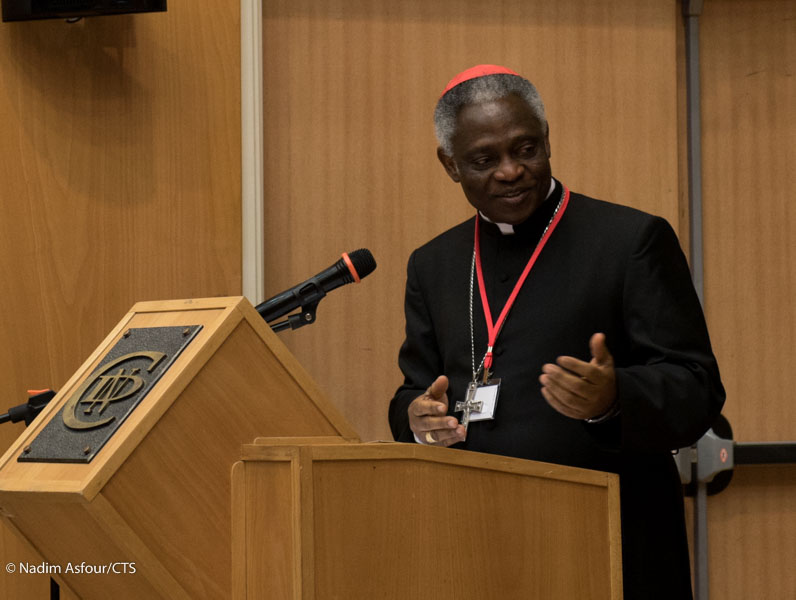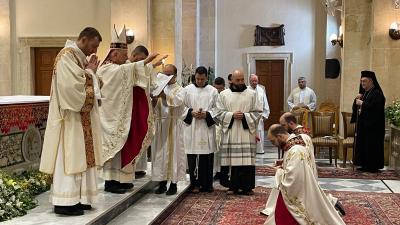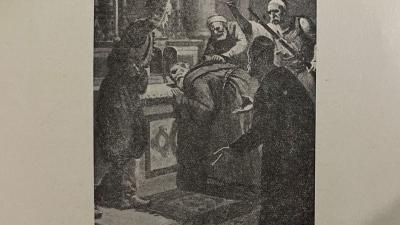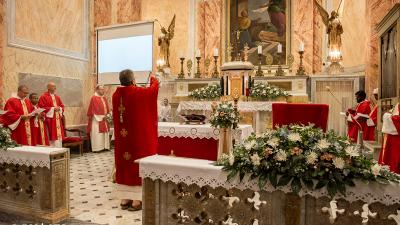
Presenting the encyclical Laudato Si’ to Israeli and Palestinian societies and discussing “integral ecology:” this was the aim of the conference that took place on March 12 at the Notre Dame Center in Jerusalem. Almost three years after the publication of Laudato Si’, the Pope’s call that was found within the encyclical to “every person who lives on this planet” was the starting point for the speakers, who came from the three different monotheistic religions, and who gave their viewpoints on the common theme of ecology. The event, which was organized by the Custody’s Commission for Justice, Peace and Integrity of Creation, was attended by Christians, Jews and Muslims, who attentively listened asked questions.
Also present [at the event] was Cardinal Peter Turkson, prefect of the Department for Integral Human Development. “Serving integral human development has many challenges, many of which are linked to ‘integral ecology,’” the cardinal said. “It is about exclusion, indifference, inequity, lack of solidarity and then the conflicts that are afflicting many countries and populations.” In the wake of what Pope Francis affirmed in Laudato Si', Mons. Turkson stressed that we must work for an “ecological conversion” that calls not only individuals but the community to action.
Respect for creation is a concept also that is also highlighted in the Qur’an, as Prof. Mohammed S. Dajani Daoudi, director and founder of the Wasatia Academic Graduate Institute, explained in his speech: “The Holy Qur'an, which is considered by all Muslims as the the main source of Islamic doctrine and beliefs, affirms that God created man on earth and that the earth itself is God’s creation, bestowed by the grace of its creator to humanity for us to appreciate it. It is [our] right and a responsibility to use the nature that God has bestowed upon us, and he wants us to protect it and preserve it.”
“The ecological task assigned to humanity is expressed in the Midrash in the book of Ecclesiastes (Kohelet Rabbah 7 Section 28),” said Rabbi David Rosen, international director of interreligious affairs (AJC). From that Midrash, three fundamental lessons can be derived: creation belongs to God who created it; humanity is in reality God’s partner in creation; and man has the responsibility of preserving creation. For this reason, in order to restore the relationship with the divine and the environment, Jews observe the precepts of the Sabbath rest and respect for the ‘sabbatical year,’ during which they cyclically leave land uncultivated land for a time.
Prof. Stefano Zamagni, Professor of Economics at the University of Bologna and member of the Pontifical Academy of Social Sciences, then focused on the very mission of mercy in the field of economics: “that of giving ‘shape’ to the market, humanizing it. A society cannot make progress on the path of integral human development by keeping the code of efficiency and the code of fraternity disjointed from one another,” said the professor.
The conclusions of the day were made by Cardinal Peter Turkson. To better understand the message of Laudato Si’, the Cardinal suggested putting the accent on ‘the seven Cs’: Continuity, Collegiality, Conversation, Care, Conversion, Citizenship and Contemplation. Man’s objective is an “ecological conversion” that leads to an “ecological citizenship,” respectful of the environment, for a contemplation of the wonders of creation.
Beatrice Guarrera




